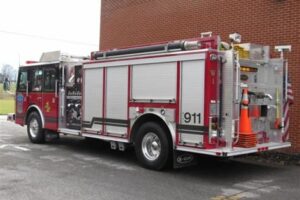Table of Contents
Can you sue a volunteer fire department? Learn about the legal rights and options available if you have been affected by the negligence or misconduct of a volunteer fire department. Discover the necessary steps to take and the potential outcomes of suing a volunteer fire department for damages. Find guidance on navigating this unique legal situation and seeking justice for any harm caused.
When disaster strikes, we count on the brave men and women of our local fire department to rush to our aid, armed with courage, expertise, and state-of-the-art equipment. However, what happens when these heroes fall short? What if the unthinkable occurs and their actions, or lack thereof, lead to further harm or even death? Can you sue a volunteer fire department for negligence? In a legal landscape where accountability is paramount, these questions are not only valid but also demand urgent answers.
Introduction
In times of emergency, we rely on the brave men and women of our local fire departments to swiftly respond to our calls for help. However, what happens if something goes wrong during a rescue operation or firefighting effort? Can you sue a volunteer fire department if they make a mistake that causes harm or damages? In this article, we will explore the legal aspects surrounding lawsuits against volunteer fire departments and shed light on the rights and responsibilities of both parties involved.
The Role of Volunteer Fire Departments
Volunteer fire departments play a crucial role in ensuring public safety in many communities around the world. These dedicated individuals sacrifice their time and often put their lives at risk to protect others from the devastating effects of fires and other emergencies. While they may not receive monetary compensation for their services, these volunteers are still expected to adhere to certain standards and protocols to ensure the best possible outcomes in their operations.
Understanding Negligence
In order to sue a volunteer fire department, it is essential to establish negligence on their part. Negligence refers to the failure to exercise reasonable care or take necessary precautions, resulting in harm or damage to another person. To successfully prove negligence, one must demonstrate that the volunteer fire department owed a duty of care to the injured party, breached that duty, and caused harm through their actions or lack thereof.
Governmental Immunity
One significant factor to consider when contemplating a lawsuit against a volunteer fire department is governmental immunity. In many jurisdictions, volunteer fire departments are considered governmental entities and, therefore, enjoy certain immunities from lawsuits. These immunities are in place to prevent excessive litigation that could hinder the ability of these essential organizations to carry out their duties effectively.
Exceptions to Governmental Immunity
While governmental immunity may shield volunteer fire departments from most lawsuits, there are exceptions to this rule. For instance, if a volunteer firefighter intentionally causes harm or acts with gross negligence, the injured party may have grounds to sue. Additionally, if the fire department engages in actions that fall outside their official duties or acts in a manner that violates established protocols, immunity may be waived, allowing legal action to proceed.
Proving Negligence in Fire Department Operations
Establishing negligence in a lawsuit against a volunteer fire department can be challenging. The burden of proof lies with the plaintiff, who must present evidence that demonstrates the fire department’s breach of duty and how that breach directly resulted in harm or damages. This often requires expert testimony, thorough investigation, and a deep understanding of firefighting practices and standards.
Limitations on Damages
Even if a lawsuit against a volunteer fire department is successful, there may be limitations on the damages that can be awarded. Governmental entities are often subject to caps on liability, meaning that the amount of compensation available to the injured party may be limited. These caps vary depending on the jurisdiction and the nature of the claim, so it is crucial to consult with an attorney familiar with local laws.
Alternative Remedies
In some cases, pursuing a lawsuit against a volunteer fire department may not be the most effective or efficient route to seek justice or compensation. Alternative remedies, such as filing a claim with the municipality or seeking assistance from insurance providers, may offer a more streamlined process for resolving disputes and obtaining financial support for damages incurred.
Improving Volunteer Fire Department Practices
Rather than solely focusing on lawsuits, it is crucial to recognize the importance of improving volunteer fire department practices and safety standards. By investing in training, equipment, and resources, communities can help prevent accidents and ensure that these brave volunteers are adequately prepared to handle emergencies effectively and minimize the risk of harm or damages.
Conclusion
Suing a volunteer fire department is a complex matter that requires a thorough understanding of the legal landscape surrounding governmental immunities, negligence, and liability caps. While it may be possible under certain circumstances, it is essential to consider alternative avenues for resolution and, more importantly, focus on supporting and improving the invaluable services provided by these selfless individuals who volunteer their time to keep our communities safe.
Can You Sue a Volunteer Fire Department?
Subtitle: Analyzing the Legal Implications of Holding Volunteer Fire Departments Accountable
In the event of an emergency, volunteer fire departments play a crucial role in providing essential services to communities. However, accidents can happen, raising the question of whether it is possible to hold volunteer fire departments legally responsible for any wrongdoing. This article delves into the legal aspects surrounding lawsuits against volunteer fire departments, exploring scenarios where such lawsuits might be viable.
Negligence and Volunteer Fire Departments:
Volunteer fire departments, like any other organization, can be held liable for negligence. If a volunteer fire department fails to meet its duties, resulting in harm or injury, it may be possible to file a lawsuit against them. However, proving negligence is a complex process.
Breach of Duty:
To successfully sue a volunteer fire department, a crucial element to establish is that the department breached its duty of care. This means demonstrating that the department failed to act reasonably, leading to harm or injury. Proving a breach of duty can be particularly challenging in cases involving volunteer firefighters who may not always possess the same level of expertise as their professional counterparts.
Immunity from Lawsuits:
In some jurisdictions, volunteer fire departments enjoy certain immunities from lawsuits. These immunities may vary based on state laws, but they are generally designed to protect volunteer firefighters from personal liability. However, it is essential to consult local legal professionals to understand the specific immunity laws in your area.
Government Substitution:
In instances where a volunteer fire department operates under the umbrella of a municipality, the government itself may be held liable for any damages caused by the department’s negligence. This process is known as government substitution and can provide an avenue for seeking compensation.
Charitable Immunity:
Some volunteer fire departments operate as charitable organizations, which may grant them additional immunity from certain lawsuits. However, this immunity typically only covers acts performed in furtherance of the department’s charitable mission. Determining whether a specific action qualifies for charitable immunity requires careful examination of applicable laws and legal precedents.
Sovereign Immunity:
In certain cases, volunteer fire departments may have sovereign immunity, which shields governmental entities from legal claims. However, sovereign immunity can be limited, and exceptions might apply if the department acts negligently or violates someone’s constitutional rights. Consultation with legal experts is vital to understand its application in your jurisdiction.
Exceptions to Immunity:
Although volunteer fire departments may commonly enjoy immunity, there are exceptions to this rule. For example, if a firefighter acts willfully or maliciously, or if the department engages in misconduct or gross negligence, the immunity may be waived, making a lawsuit viable.
Statutes of Limitations:
When considering a lawsuit against a volunteer fire department, it is crucial to familiarize oneself with the applicable statutes of limitations. These time frames restrict the period within which a lawsuit can be filed. Failing to file a claim within the specified time could result in forfeiting the opportunity to seek compensation.
Conclusion:
Lawsuits against volunteer fire departments are subject to specific legal considerations and complexities. While it is possible to hold volunteer fire departments accountable under certain circumstances, navigating the legal process can be challenging. Consulting with legal professionals is essential to understand the laws and regulations governing volunteer fire departments in your jurisdiction.
As a journalist reporting on legal matters, it is imperative to examine the question of whether it is possible to sue a volunteer fire department. Delving into this topic requires exploring both the legal framework and the potential implications for these organizations.
1. Volunteer Fire Departments and Their Role:
- Volunteer fire departments play a crucial role in many communities, providing firefighting services and responding to emergency situations.
- These organizations are typically comprised of dedicated individuals who offer their time and expertise without compensation.
- Their selfless commitment to public safety is often lauded and appreciated by the communities they serve.
2. Immunity Under the Law:
- One important aspect to consider is the legal principle of immunity that protects volunteer fire departments from certain types of lawsuits.
- Many jurisdictions have enacted laws granting immunity to these organizations, shielding them from liability arising from their firefighting and rescue activities.
- This immunity is generally designed to encourage volunteerism and ensure the continued availability of vital emergency services.
- However, it is important to note that the extent and scope of this immunity can vary from one jurisdiction to another.
3. Exceptions to Immunity:
- While volunteer fire departments may enjoy general immunity, there are exceptions that allow for legal action under certain circumstances.
- These exceptions typically arise when the organization behaves with gross negligence or willful misconduct, resulting in harm or injury to individuals.
- If it can be proven that the volunteer fire department acted recklessly or negligently, a lawsuit may be pursued.
4. Importance of Case-Specific Analysis:
- It is crucial to emphasize that determining the viability of suing a volunteer fire department requires a case-specific analysis.
- Each situation must be evaluated based on the unique circumstances, local laws, and applicable legal precedents.
- Consulting with a qualified attorney who specializes in personal injury or municipal law would be essential for anyone considering legal action against a volunteer fire department.
5. Balancing Accountability and Volunteerism:
- While the question of suing a volunteer fire department may arise in certain circumstances, it is important to consider the potential consequences.
- Legal action against these organizations could have a detrimental impact on their ability to recruit and retain volunteers, ultimately compromising the availability of vital emergency services.
- Therefore, striking a balance between accountability and recognizing the selfless nature of volunteerism becomes crucial in any legal considerations.
In conclusion, the ability to sue a volunteer fire department is subject to the specific laws and exceptions in place within a particular jurisdiction. While immunity generally protects these organizations from liability, legal action may be pursued if gross negligence or willful misconduct can be established. However, it is important to carefully assess each case’s unique circumstances and consult with legal experts to ensure a comprehensive understanding of the potential implications of such lawsuits. Recognizing the importance of volunteerism and its impact on public safety is essential when considering any legal action against these selfless organizations.
Dear valued blog visitors,
Thank you for taking the time to read our article on the topic of whether or not it is possible to sue a volunteer fire department. We hope that you have found the information provided to be informative and thought-provoking. As we conclude this discussion, we would like to recap some of the key points that have been covered and offer some final thoughts on the matter.
Firstly, it is important to remember that volunteer fire departments play a crucial role in our communities. These dedicated individuals selflessly give their time and effort to keep us safe and protect our property from the devastating effects of fires. Their commitment and bravery should be commended, and it is essential to recognize the challenges they face, often with limited resources and funding.
However, there may be instances where mistakes are made or negligence occurs, which can lead to questions about liability and the possibility of legal action. While it is generally more challenging to sue a volunteer fire department compared to a professional one, it is not entirely impossible. The key factor that determines the potential success of a lawsuit is establishing negligence, just as with any other legal claim.
In order to successfully sue a volunteer fire department, one must provide evidence that the department or its members acted negligently or failed to meet the standard of care expected in that situation. This can be a complex process, as volunteers are often protected by certain legal immunities and defenses. However, if it can be proven that gross negligence or intentional misconduct occurred, it may be possible to hold the department accountable.
In conclusion, while it is generally more challenging to sue a volunteer fire department compared to a professional one, it is not entirely impossible. The decision to pursue legal action should not be taken lightly and requires a thorough understanding of the specific circumstances and legal complexities involved. It is always advisable to consult with a qualified attorney who specializes in personal injury or negligence cases to assess the viability of your claim.
Once again, we appreciate your readership and hope that this article has provided you with valuable insights on the topic. We encourage you to continue exploring other articles on our blog and engage with us through comments, questions, or suggestions.
Thank you and stay safe!
.
1. Can you sue a volunteer fire department?
Yes, it is possible to sue a volunteer fire department under certain circumstances. While volunteer fire departments are generally immune from lawsuits due to their status as government entities or non-profit organizations, there are exceptions.
2. What are the reasons one can sue a volunteer fire department?
There are several situations in which someone may be able to sue a volunteer fire department:
- If the department acted negligently or recklessly, resulting in harm or damage.
- If the department failed to respond appropriately or in a timely manner to an emergency situation.
- If a volunteer firefighter caused injury or harm due to their actions or negligence.
- If the department breached a duty of care owed to an individual or property.
3. How can negligence be proven in a lawsuit against a volunteer fire department?
In order to prove negligence on the part of a volunteer fire department, the following elements must typically be established:
- Duty of care: Showing that the department had a legal obligation to act in a certain way to protect individuals or property.
- Breach of duty: Demonstrating that the department failed to meet its duty of care through actions or omissions.
- Causation: Establishing a direct link between the department’s breach of duty and the resulting harm or damage.
- Damages: Providing evidence of actual harm or loss suffered as a result of the department’s actions or negligence.
4. What steps should be taken if considering a lawsuit against a volunteer fire department?
If you believe you have a valid claim against a volunteer fire department, it is important to consult with an attorney who specializes in personal injury or negligence cases. They can assess the merits of your case, gather evidence, and guide you through the legal process.
5. Can a volunteer firefighter be personally sued?
Yes, it is possible to sue a volunteer firefighter individually if their actions or negligence caused harm or damage. However, the extent of liability may depend on factors such as the firefighter’s training, their role within the department, and whether they were acting within the scope of their duties at the time of the incident.
6. Are there any limitations on filing a lawsuit against a volunteer fire department?
Yes, there are typically statutes of limitations that restrict the time period within which a lawsuit can be filed. These limitations vary by jurisdiction, so it is crucial to consult with an attorney to ensure your claim is filed within the applicable timeframe.
Remember, the information provided here is general in nature and should not be considered legal advice. It is always recommended to consult with a qualified attorney for guidance specific to your situation.






